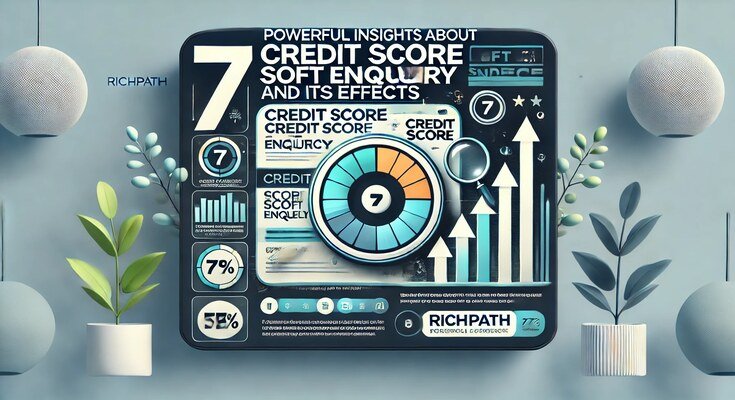Your credit score is one of the most important numbers in your financial life. It influences your ability to get loans, credit cards, and sometimes even a house on rent. While most people are familiar with terms like CIBIL score or credit report, many get confused when they hear about a credit score soft enquiry. It sounds technical, but it’s actually quite simple. Understanding how a soft enquiry works, how it is different from a hard enquiry, and how it shows up on your report can help you make better financial decisions without worrying unnecessarily about your score.
What Is a Credit Score Soft Enquiry?
A credit score soft enquiry is a check of your credit report that does not affect your credit score in any way. Think of it as a background look into your financial history rather than a formal request for credit. For example, when you check your own credit score through CIBIL, Experian, or other apps, it counts as a soft enquiry. Similarly, if a bank sends you a pre-approved credit card or home loan offer, that also involves a soft enquiry.
The key point is that these enquiries are not shared with lenders when you apply for a loan. They are only visible to you, which means they don’t raise any red flags about frequent credit checks or loan applications.
How Is a Credit Score Soft Enquiry Different from a Hard Enquiry?
A lot of confusion arises because people don’t always know the difference between soft and hard enquiries. A hard enquiry happens when you apply for a loan, credit card, or any kind of borrowing. The bank or lender checks your report to decide if you qualify. Each hard enquiry is recorded and can reduce your score slightly, especially if there are too many in a short period of time.
In contrast, a credit score soft enquiry has no impact at all. You can check your score as many times as you like, and it won’t make a difference. For example, if you apply for a personal loan at a bank, that’s a hard enquiry. But if the bank checks your report to send you a pre-approved offer, that’s a soft enquiry. Knowing this difference helps you avoid unnecessary worries when keeping track of your credit health.
Why Are Credit Score Soft Enquiries Important?
Even though a credit score soft enquiry doesn’t influence your score, it plays a useful role in everyday situations. Banks rely on them to decide who should get pre-approved offers, which saves time for both sides. Employers may use soft enquiries during background checks for jobs where financial responsibility is important. Landlords sometimes check credit reports before renting out property. And on a personal level, regular soft enquiries let you monitor your own credit without damaging your score.
For instance, if you log in to your bank’s app to check your score before applying for a car loan, that’s a soft enquiry. You get valuable information about where you stand financially, without taking any hit on your creditworthiness.
Do Credit Score Soft Enquiries Have Any Negative Effects?
The good news is that soft enquiries themselves don’t have any negative effects on your credit score. You could check your score every month and it wouldn’t matter. However, there are a couple of things to be aware of.
First, multiple soft enquiries might sometimes be misread if combined with hard enquiries, though this is rare. Second, soft enquiries by banks often trigger promotional calls or emails about pre-approved offers. While these can be useful, they can also become irritating if you receive too many. Aside from that, there’s no downside.
How to Maintain a Healthy Credit Score(Credit Score Soft Enquiry)
Whether it’s a soft or hard enquiry, the bigger picture is maintaining a strong credit profile. Here are some practical habits that make a difference:
-
Limit hard enquiries: Avoid applying for loans or credit cards at multiple places in a short span. Compare offers online first, then apply where you have the best chance of approval.
-
Check your score regularly: Use apps like CRED, Experian, or CIBIL’s official platform to track your score through soft enquiries. This helps you spot errors or sudden changes early.
-
Pay your bills on time: Whether it’s EMIs or credit card dues, timely payments are the most important factor in keeping your score strong.
-
Keep your credit usage low: Don’t max out your credit cards. Try to keep your usage below 30% of your total credit limit.
-
Fix errors quickly: If you notice a wrong entry on your report, raise a dispute with the credit bureau immediately.
A Practical Example
Take Anita, a 35-year-old software engineer in Mumbai. She wanted to know if she was eligible for a home loan, so she checked her credit score through her bank’s app. That soft enquiry showed she had an excellent score. As a result, she received a pre-approved home loan offer at a competitive rate. The process gave her useful information and an opportunity, all without lowering her credit score.
FAQs About Credit Score Soft Enquiry
Q: Can I see soft enquiries on my report?
Yes, you can see them, but lenders cannot.
Q: How many soft enquiries are allowed?
There’s no limit. You can check your score as often as you like.
Q: Can I dispute a soft enquiry?
You usually don’t need to since it doesn’t affect your score, but you can raise a dispute if you see something inaccurate.
Conclusion(Credit Score Soft Enquiry)
A credit score soft enquiry is a harmless way to check your financial standing, whether done by you, a bank, or even a landlord. Unlike hard enquiries, it won’t reduce your score or affect your ability to borrow. By understanding how it works and using it to monitor your credit health, you can stay on top of your finances and make better decisions. Combine regular soft enquiries with good habits like timely payments and low credit usage, and you’ll keep your credit score in excellent shape for the future




